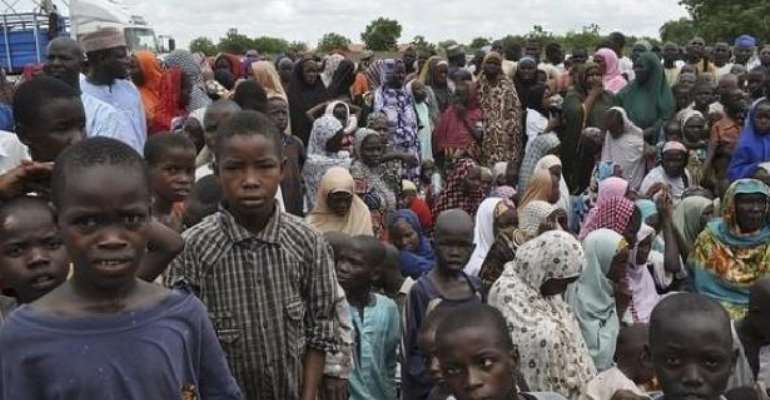BOKO HARAM VICTIMS AND THE DILEMMA OF HUMAN SECURITY

The Bokoharam terrorists constitute threat to human security not only in the northeastern part, but Nigeria as a whole. The National Emergency Management Agency (NEMA) in her latest report stated that no fewer than three million Nigerians in Borno, Yobe, and Adamawa faced serious humanitarian crisis. In specifics, Borno state has the highest with 1, 304,393, followed by Adamawa (1,086,126) and Yobe (771,368) respectively. The declaration of state of emergency by President Goodluck Jonathan in 2013 has not restored peace because more communities and institutions have been attacked with dire outcomes including death, destruction of properties and livelihood and a burgeoning of internally displaced persons (IDPs) as victims. Mostly affected are women, children and the aged. The International Displacement Monitoring Center (IDMC) in 2013 opined that there is little information about the protection and assistance needs of these victims. Most IDPs at best live with host families, and neither the government nor international organizations have systematically assessed or addressed their situation.
Experiences of terrorism vary depending on ethnic nationalities. For the non-indigenes who are victims, the assistance available to them depends on the contacts they made with their home states prior to experiencing terrorism. Those who maintained contacts with their people in home states may enjoy reciprocal support based on their extension of goodwill and vice versa. Northeasterners may stay within the zone and cope or run to another state where they become strangers, socially excluded and stigmatized. However, there are those who rather than stay in IDPs camps stay with relatives. As Boko haram terrorists rage on, many people become direct or indirect victims while others simply become more vulnerable. Youths run the risk of being recruited to fight against the security agencies of government. They are sometimes conscripted or lured with cash. They are told of their eternal rewards by Allah for 'working for God'. Their recruitment into Bokoharam is partly to provide strength into their 'army' as well as provide local knowledge of the area for their operation. Children, as victims of Bokoharam may suffer lifelong incapacitation due to lack of support systems which target specific needs of victims of terror. In essence, the victims need social protection.
Social protection refers to publicly mandated policies and programmes to address risk and vulnerability among poor and near-poor households including problems of insecurity. Existing social protection interventions for victims of Bokoharam involve the setting up of IDP camps in abandoned schools, security facilities and orientation camps of the National Youth Service Corp (NYSC). The state governments of Borno, Yobe and Adamawa through their state emergency management agency (SEMA) set up committees which coordinate activities at the camps. They distribute relief materials. The government of Borno, for instance inaugurated a civilian security code-named “Civilian Joint Task Force” designed to work with state security agencies in checking insurgency. Although they have averted some attacks, the massacre and abduction of hapless residents in the states show limited capacity of this group in safeguarding lives and properties. Also there is the victim of terrorism committee which co-ordinates and consults with the governor on those in need of special assistance for approval. This is not without bottlenecks. The Red Cross society provides first aid, evacuation of the injured, restoration of family links, economic assistance to widows and psycho-social support. The federal government on the other hand unfolded a three-pronged national emergency relief programme for the victims. These are still at the infancy. It involves the emergency relief window, reconstruction and rehabilitation window and safe schools window. It is important to know that social protection supply to victims face the challenges of insecurity, poor funding and poor coordination at federal and state levels. Of these security is the most important. No social protection intervention can reach victims or work when there is pervading news of insecurity. Most unmet needs include shelter, livelihood, protection, health and food and nutrition. Government should establish trauma centres and ensure provision of relief materials to victims by the appropriate agencies. They should also provide alternative to schools that have remained closed in the northeast of the country. There should be build-up security presence, particularly in the conflict areas and other areas in the country. To enhance social protection of victims, Nigeria must design a holistic policy to address the shattered livelihoods of victims. This policy should focus on the peculiar needs of terror victims and incorporate durable solutions to identified problems.
Written by Dr.Oludayo Tade.
